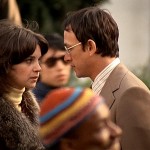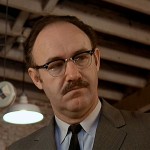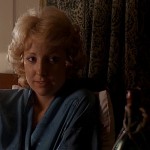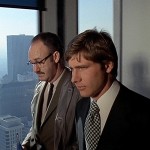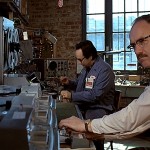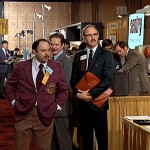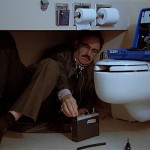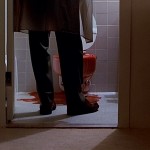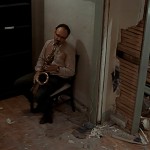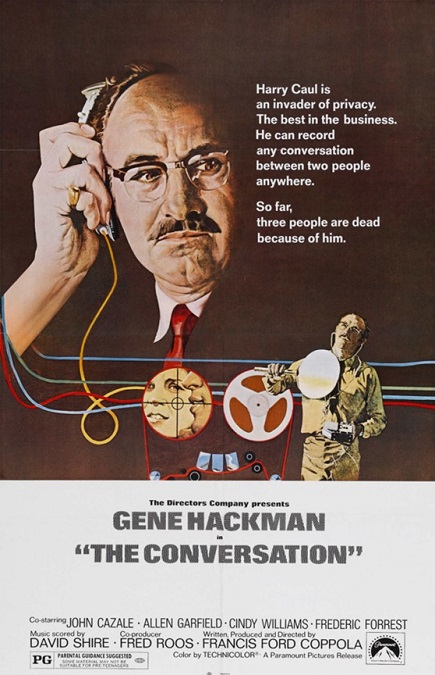
The Conversation – 1974
This was a fascinating little movie. It didn’t seem like it would need a big budget, a large cast, or a lot of different sets or costumes. It was a small story that delved in the mind of its main protagonist. One might call it a psychological thriller, though the plot’s real suspense only showed up in the last half an hour or so. Actually the suspense began at the beginning of the film, but the build-up was so slow and gradual that I didn’t even realize it was there until it was too late.
Gene Hackman starred as Harry Caul, a professional private surveillance man. He spied on people for money, and apparently, he was the best in the business. As you might imagine, it takes a certain kind of personality to violate the privacy of unwitting victims for a living, but Harry seemed to have just the right combination of social and emotional dysfunctions to enable him to excel at his trade. However, it also ensures that he is a very lonely man who cannot competently interact with his fellow human beings, as is evidenced by his failing relationship with a woman named Amy, played by Teri Garr, a woman who would love him if he could only allow himself to tell her anything about his personal life.
He was naturally paranoid, profoundly suspicious, emotionally crippled, and intentionally detached from normal society. He would use any trick he could to record private conversations, then sell the secrets he learned to other unscrupulous people who were willing to pay. The trade-off is that he spends so much time spying on strangers, he is terrified about being spied upon, himself.
The conversation we see him recording at the start of the film is between Mark and Ann, played by Fredrick Forrest and Cindy Williams, as they wander through a crowded, noisy, outdoor environment. We hear it only in bits and pieces. But then, as Harry and his associate, Stan, played by John Cazale, study the tapes, we slowly begin to get a better sense of what was said and the order in which it was spoken. Afterword, he takes the incriminating recording of the conversation to the men who hired him, a man known only as The Director, and his assistant, played by Robert Duvall and Harrison Ford, respectively.
Now, here is where the tension really starts to ramp up. At one point, a piece of the conversation cannot be heard because it took place near a loud band playing music. But when Harry is able to filter out the ambient noise, he hears something that curdles his blood. He hears Mark say, “He’d kill us if he had the chance,” and knows that someone is contemplating murder. What should he do?
The movie explores certain themes such as the morality of covert surveillance, and paranoia. The character of Harry Caul is a wonderful study in both of these things. He tells himself that he is alright with his profession because he doesn’t get emotionally involved in the cases on which he works. Unfortunately, when the secrets he learns lead to murder, he cannot maintain his emotional distance.
It was the film’s ending, that last half an hour, which boosted the film from average to fascinating. The conversation, which we hear over and over again throughout the movie, yields the name of a hotel, a room number, and a date where something is supposed to happen. We the viewers, start to become emotionally involved right along with Harry.
Harry, however, paranoid and suspicious as he is, doesn’t go to the police with the secrets he has learned, but goes to the hotel himself, possibly in hopes of preventing the murder. He drills through the wall in the bathroom to listen in on what is going on in the room, but abandons his surveillance equipment when the screaming starts. He can hear what is going on through the thin walls of the hotel with his own ears.
But the film throws us a curve ball. We have been led to believe that Mark and Ann are going to be murdered, but they, themselves, turn out to be the murderers. And Harry can do nothing to stop it. It was a very well written plot twist and Hackman really did a great job. In fact, Hackman did a fantastic job in general. I have always liked him as an actor and his character could very easily have been over the top or border on ridiculous. Instead, he made me feel for him and even like him, at times. And as you might imagine, it is not always easy to like a character with so many negative qualities.
The last scene in the film was creepy and poignant, laying bare Harry’s psyche and showing just how deeply his paranoia is a part of his personality. The murderers have learned that Harry knows what happened and they bug his apartment. They let him know that he, the one who is always the watcher and the listener, is now the victim of an invaded privacy. The knowledge drives him insane. It was a creepy and perfectly executed ending to a movie that I found surprisingly engaging.
